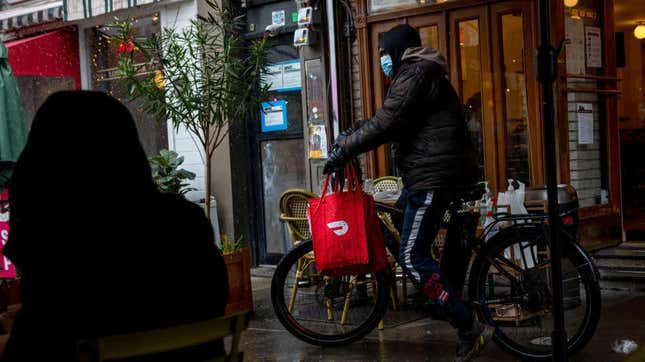
Sometimes a tweet can lead to actual change. Nearly a year ago, in January 2020, San Francisco restaurant owner Pim Techamuanvivit let loose a Twitter thread about how a customer had called up her restaurant, Kin Khao, to ask why he hadn’t received his delivery order yet. Techamuanvivit was confused because Kin Khao has never offered delivery. But when she did a little internet sleuthing, she discovered that Seamless, Grubhub, DoorDash, and Yelp all contained listings purporting to be Kin Khao. “They’re so hungry to get your money,” she concluded, “they don’t care who makes the food they’re delivery to your home. It can be some rando dirty warehouse somewhere. Because they sure are not picking up the food from @KinKhao.”
Techamuanvivit called her lawyer to see what could be done. It turned out Kin Khao wasn’t the only restaurant with fraudulent listings on delivery apps. By mid-February, California Assemblywoman Lorena Gonzalez had proposed a bill in the state legislature that would require delivery apps to get the consent of restaurants before creating listings for them. Ensuing events that led to an increased interest in takeout (you know why) helped to create more support for the bill, which Governor Gavin Newsom signed into law in September. It went into effect last week, on January 1.
The upshot is that the apps will have to remove thousands and thousands of listings. Postmates, for example, boasted delivery for 700,000 restaurants nationwide. It had partnerships with just 115,000 of them, The Wall Street Journal reported. Under the new law, it will have to remove 40,000 listings in California. Other apps face similar losses and decreases in market share.
Did you hear the sound of restaurant owners and app-haters across America cackling with glee?
Over the past year, we’ve only discovered more reasons to hate third-party apps, from coercing restaurants to participate to the dirty tricks they play on restaurants who don’t to the exorbitant fees they charge both restaurants and customers to underpaying drivers. They don’t even make any money. And yet somehow, where the customers are concerned, the problem is with the restaurants, not the apps.
“As far as the customer knows, the fault is mine,” Billy Joe Agan, owner of Eli’s Mile High Club in Oakland, told Eater SF. “A customer makes an order, they assume it’s made as part of a partnership between Eli’s and an app, and then I’m saying no. Then the delivery app tells the customer ‘They refused your order’ and I’m the asshole, even though I’ve never agreed to be on any of these apps.”
Lawsuits against third-party apps have been filed in other states. Let’s hope that they lead to similar laws elsewhere.